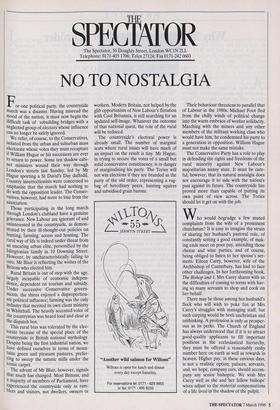SPECTATOR
The Spectator, 56 Doughty Street, London WC1N 2LL Telephone: 0171-405 1706; Telex 27124; Fax 0171-242 0603
NO TO NOSTALGIA
For one political party, the countryside March was a disaster. Having misread the mood of the nation, it must now begin the difficult task of rebuilding bridges with a neglected group of electors whose influence can no longer be safely ignored. We refer, of course, to the Conservatives, isolated from the urban and suburban mass electorate whose votes they must recapture if William Hague or his successors are ever to return to power. Some ten shadow cabi- net ministers wound their way through London's streets last Sunday, led by Mr Hague sporting a St David's Day daffodil. Country insurrectionists were concerned to emphasise that the march had nothing to do with the opposition leader. The Conser- vatives, however, had more to lose from the association.
Those participating in the long march through London's clubland have a genuine grievance. New Labour are ignorant of and uninterested in the countryside, as demon- strated by their ill-thought-out policies on hunting, farming, access and housing. The rural way of life is indeed under threat from an uncaring urban elite, personified by the Islingtonian family in 10 Downing Street. However, by uncharacteristically failing to care, Mr Blair is reflecting the wishes of the Britons who elected him.
Rural Britain is out of step with the age, largely incapable of economic indepen- dence, dependent on tourism and subsidy. Under successive Conservative govern- ments, the shires enjoyed a disproportion- ate political influence; farming was the only industry that merited its own client ministry in Whitehall. The heavily accented voice of the countryman was heard loud and clear at the dispatch box.
This rural bias was tolerated by the elec- torate because of the special place of the countryside in British national mythology. Despite being the first industrial nation, we have defined ourselves in terms of moun- tains green and pleasant pastures, prefer- ring to sweep the satanic mills under the iconic carpet.
The advent of Mr Blair, however, signals that much has changed. Most Britons, and a majority of members of Parliament, have experienced the countryside only as ram- blers and visitors, not dwellers, owners or workers. Modern Britain, not helped by the glib opportunism of New Labour's flirtation with Cool Britannia, is still searching for an updated self-image. Whatever the outcome of that national quest, the role of the rural will be reduced.
The countryside's electoral power is already small. The number of marginal seats where rural issues will have much of an impact on the result is tiny. Mr Hague, in trying to secure the votes of a small but solid conservative constituency, is in danger of marginalising his party. The Tories will not win elections if they are branded as the party of the old order, representing a rag- bag of hereditary peers, hunting squires and subsidised grain barons. Their behaviour threatens to parallel that of Labour in the 1980s. Michael Foot fled from the chilly winds of political change into the warm embrace of worker solidarity. Marching with the miners and any other members of the militant working class who would have him, he condemned his party to a generation in opposition. William Hague must not make the same mistake.
The Conservative Party has a role to play in defending the rights and freedoms of the rural minority against New Labour's majoritarian nanny state. It must be care- ful, however, that its natural nostalgia does not encourage it to side with the nation's past against its future. The countryside has proved more than capable of putting its own point of view across. The Tories should let it get on with the job.
Who would begrudge a few muted complaints from the wife of a prominent churchman? It is easy to imagine the strain of sharing her husband's pastoral role, of constantly setting a good example, of mak- ing ends meet on poor pay, attending those cheese and wine parties, and of course, being obliged to listen to her spouse's ser- mons. Eileen Carey, however, wife of the Archbishop of Canterbury, has had to face other challenges. In her forthcoming book, The Bishop and 1, Mrs Carey shares with us the difficulties of coming to terms with hav- ing so many servants to shop and cook on her behalf.
There may be those among her husband's flock who will wish to poke fun at Mrs Carey's struggles with managing staff, but such carping would be both unchristian and unthinking. A profession is only as prosper- ous as its perks. The Church of England has always understood that if it is to attract good-quality applicants to fill important positions in the ecclesiastical hierarchy, they must be offered a reasonably cushy number here on earth as well as rewards in heaven. Higher pay, in these envious days, is not a realistic option; palaces, servants, and, we hope, company cars, should accom- pany any senior bishopric. We wish Mrs Carey well as she and her fellow bishops' wives adjust to the material compensations of a life lived in the shadow of the pulpit.


























































 Previous page
Previous page